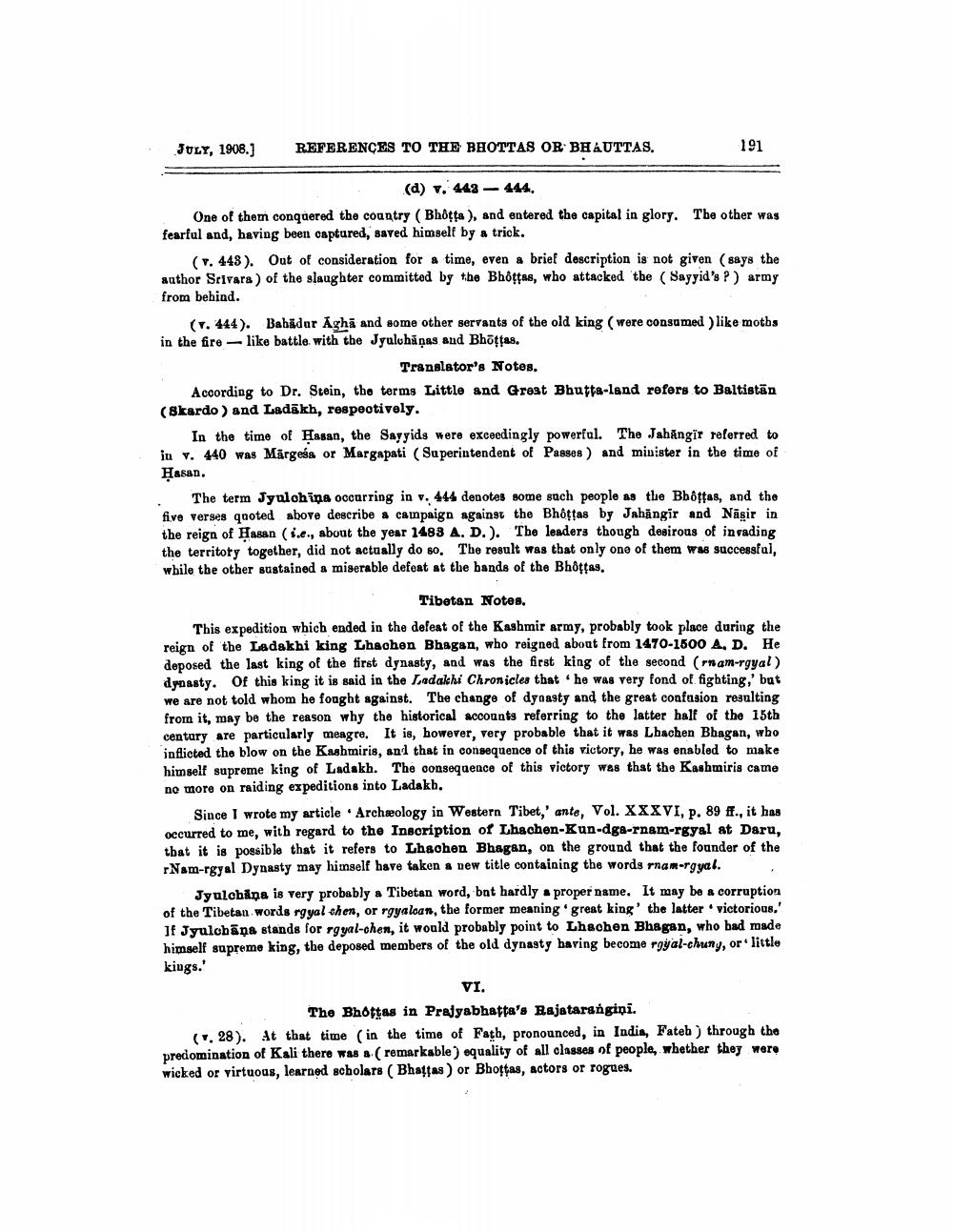________________
JULY, 1908.)
REFERENCES TO THE BHOTTAS OR BHAUTTAS.
191
(d) v, 442 - 444 One of them conquered the country (Bhota ), and entered the capital in glory. The other was fearful and, having been captured, saved himself by a trick.
(v. 448). Out of consideration for a time, even a brief description is not given (says the author Srivara) of the slaughter committed by the Bhotas, who attacked the (Sayyid's ?) army from behind.
(v. 444). Bahadur Aghi and some other servants of the old king (were consumed ) like motbs in the fire-like battle with the Jyuluhaņas and Bhūttas.
Translator's Notes. According to Dr. Stein, the terms Little and Great Bhutta-land refers to Baltistān (Skardo ) and Ladakh, respectively.
In the time of Hasan, the Sayyids were exceedingly powerful. The Jahangir referred to in v. 440 was Märgeáa or Margapati (Superintendent of Passes ) and minister in the time of asan.
The term Jyuloh ina occurring in v. 444 denotes some such people as the Bbotas, and the five verses quoted above describe a campaign against the Bhôtfas by Jahāngir and Nasir in the reign of Hasan (s.e., about the year 1483 A. D.). The leaders though desirous of invading the territory together, did not actually do so. The result was that only one of them was successful, while the other sustained a miserable defeat at the bands of the Bhofas,
Tibetan Notes. This expedition which ended in the defeat of the Kashmir army, probably took place during the reign of the Ladakhi king Lhachen Bhagan, who reigned about from 1470-1600 A, D. He deposed the last king of the first dynasty, and was the first king of the second (rnam-rgyal) dynasty. Of this king it is said in the Ladakhi Chronicles that he was very fond of fighting,' bat we are not told whom he fought against. The change of dynasty and the great confusion resulting from it, may be the reason why the historical accounts referring to the latter half of the 15th century are particularly meagre. It is, however, very probable that it was Lhachen Bhagan, who inflicted the blow on the Kashmiris, and that in consequence of this victory, he was enabled to make himself supreme king of Ladakh. The consequence of this victory was that the Kashmiris came no more on raiding expeditions into Ladakh.
Since I wrote my article Archæology in Western Tibet,' ante, Vol. XXXVI, p. 89 ff., it has occurred to me, with regard to the Inscription of Lhachen-Kun-dga-rnam-rgyal at Daru, that it is possible that it refers to Lhschen Bhagan, on the ground that the founder of the Nam-rgyal Dynasty may himself have taken a new title containing the words mam-rgyal. ,
Jyulchina is very probably a Tibetan word, bat hardly a proper name. It may be a corruption of the Tibetan words rgyal then, or rgyaloan, the former meaning great king' the latter victorious.' if Jyuloba na stands for rgyal-ohen, it would probably point to Lhaohon Bhagan, who had made himself supreme king, the deposed members of the old dynasty having become rgyal-chuny, or little kings.'
VI. The Bhottas in Prajyabhatta's Bajatarangini. (1.28). At that time (in the time of Fath, pronounced, in India, Fateh ) through the predomination of Kali there was a remarkable ) equality of all classes of people, whether they were wicked or virtuous, learned scholars (Bhattas) or Bhoftas, actors or rogues.




